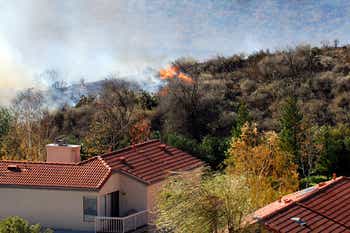Whether it’s a wildfire or residential fire, these infernos can happen suddenly and cause devastating damage, leaving you wondering if your homeowners insurance has you covered. The good news is that most standard homeowners insurance policies cover fire damage. This means if your home is damaged or destroyed by a fire, your insurance can help you rebuild and replace what was lost.
In this blog, we’ll break down exactly how fire damage is covered under homeowners insurance, what steps to take after a fire, and what you can do to protect your home from this kind of disaster.
Minimizing the Risk of a Fire-Damaged Home
While homeowners insurance is there to help you recover from a fire, taking these precautions and preventative measures can help prepare your home before disaster strikes.
Fire Prevention Tips
Here are some easy ways you can help reduce the risk of a fire:
- Install smoke detectors: Installing smoke detectors is one of the simplest, yet most effective ways to protect your home from fire. Make sure you have them in all the right areas, like the kitchen, bedrooms, and hallways. You should also test them regularly and change the batteries at least once a year.
- Regularly maintain your electrical system: Old or faulty wiring can be a fire waiting to happen. If you notice flickering lights, frequently tripped breakers, or other signs of electrical issues, don’t wait. Have a licensed electrician to identify and address potential hazards before they become a problem.
- Safely store flammable materials: Everyday items like cleaning supplies, paint, and gasoline are often flammable, so keep them in their original containers, securely sealed, and away from heat sources. If possible, keep them outside of your main living areas to reduce the risk.
Create an Emergency Preparedness Plan
Even with the best prevention measures, accidents can still happen. That’s why having a solid emergency preparedness plan is key.
- Establish a fire escape plan: Every family member should know at least two ways to exit each room in case of a fire. Practice this escape plan regularly so everyone is familiar with it and can act quickly in an emergency.
- Keep a fire extinguisher accessible: A fire extinguisher can be a lifesaver, so keep one in easy-to-reach places, such as the kitchen and near bedrooms. Also, make sure everyone in your household knows how to use it.
- Ensure a safe meeting spot for family members: After everyone escapes, it’s important to have a designated meeting spot outside, like a specific tree or a neighbor’s yard. This helps first responders know if anyone is still inside and ensures no one goes back into a dangerous situation.
If Your House Burns Down, What Does Insurance Cover?
Dealing with a house fire is incredibly stressful, but knowing what your insurance covers can help you breathe a little easier. Let’s dive into what you can expect your homeowners insurance to cover if the worst happens.
Dwelling Coverage
Dwelling coverage is the part of your insurance that takes care of your home’s structure — e.g., the walls, roof, floors, etc. If a fire damages or destroys your house, this coverage helps pay to repair or rebuild it. It also covers attached structures like a garage, deck, or porch.
Personal Property Coverage
Personal property coverage helps replace the things you own that get damaged or destroyed in a fire — e.g., furniture, electronics, clothes, etc. However, some high-value items, like jewelry or artwork, may have coverage limits. It’s a good idea to check your policy and consider additional coverage.
Additional Living Expenses (ALE)
After a fire, you might not be able to live in your home while it’s being repaired. This is where additional living expenses (ALE) coverage comes into play. ALE helps cover the costs of temporary housing, meals, and other living expenses you may incur while your home is being rebuilt.
Exclusion and Limitations
While insurance does cover many incidents, there are some exclusions and limitations. For example, your insurance usually won’t cover damage caused by neglect — like failing to fix faulty wiring. You might also wonder: Does homeowners insurance cover arson? If the act was committed by someone else without the homeowner’s knowledge or involvement, insurance generally covers it. However, if you intentionally set your home on fire, then your insurance wouldn’t cover the damages.
Your coverage also has limits, meaning there’s a maximum amount the insurance company will pay out. For instance, if your policy covers your home up to $300,000, and the cost to rebuild is $350,000, you’d be responsible for covering the extra $50,000. Similarly, if your personal property coverage is capped at $100,000, but the total value of your belongings is $120,000, you’d need to cover the additional $20,000 yourself.
Immediate Steps to Take After a Fire
As soon as you and your family are safe, you should contact your insurance company immediately to report the fire. The sooner you start this process, the quicker you can begin rebuilding.
File a Claim
Before filing your claim, gather all necessary documentation. This includes your policy number, a detailed inventory of damaged or lost items, photos and videos of the damage, and any receipts or proof of purchase for high-value items.
Next, reach out to your insurance agent or the claims department to start the process. Provide them with all the gathered documentation and be prepared to answer any questions they may have about the incident.
Then, your insurance company will provide you with claim forms to fill out. Be thorough and accurate when completing these forms. Any missing or incorrect information can delay the processing of your claim.
Work with an Adjuster
Once you’ve filed your claim, your insurance company will assign an insurance adjuster to your case. Their job is to assess the damage and determine how much the insurance company should pay for the repairs or replacement of your property.
If possible, be present when the adjuster inspects your property. Walk them through the damage and provide any documentation you’ve gathered. Also, don’t be afraid to ask questions or clarify anything that seems unclear. Lastly, cover damaged walls, doors, windows and roofs with plastic sheeting or plywood after the insurance adjuster concludes the inspection.
If you feel that the adjuster’s assessment is not fair or accurate, you have the right to get a second opinion. You can hire a public adjuster or an independent contractor to provide an additional estimate.
Conclusion
Dealing with the aftermath of a house fire is never easy, but knowing what to do and how your insurance can help makes a tough situation a bit easier to handle.
If you’re searching for reliable, cheap homeowners insurance that still gives you the protection you need, Mercury has got you covered. We offer affordable rates without cutting corners on coverage.


